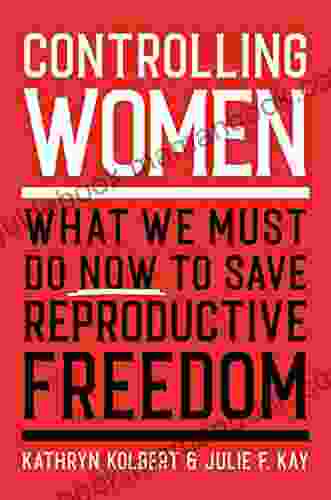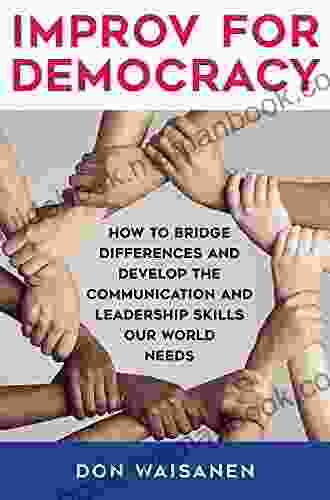Bridging Differences: Developing Communication and Leadership Skills for Unity and Success

In today's globalized and interconnected world, it is imperative to possess the ability to navigate and bridge differences effectively. Whether in the workplace, community, or society as a whole, diversity and inclusion are key ingredients for innovation, productivity, and progress. However, bridging differences requires more than just acknowledging or tolerating them; it requires actively fostering open communication, understanding, and collaboration. This article delves into the importance of developing strong communication and leadership skills as essential tools for bridging differences and achieving unity and success in diverse environments.
5 out of 5
| Language | : | English |
| File size | : | 14280 KB |
| Text-to-Speech | : | Enabled |
| Screen Reader | : | Supported |
| Enhanced typesetting | : | Enabled |
| Word Wise | : | Enabled |
| Print length | : | 280 pages |
Understanding the Importance of Communication
Communication is at the heart of bridging differences and building strong relationships. Effective communication enables us to express our thoughts, feelings, and experiences in a way that others can understand. It allows us to share ideas, build rapport, and work together towards common goals.
When we communicate effectively, we create a space for open dialogue, where diverse perspectives can be heard and respected. It allows us to bridge the gaps between different cultures, backgrounds, and beliefs. By actively listening to and understanding the perspectives of others, we can foster a climate of trust and inclusivity.
Developing Essential Communication Skills
Developing effective communication skills requires a multi-dimensional approach that encompasses both verbal and nonverbal elements. Here are some key strategies to enhance your communication abilities:
1. Active Listening
Active listening involves paying full attention to what others are saying, both verbally and nonverbally. It requires asking clarifying questions, summarizing key points, and demonstrating empathy and understanding. By practicing active listening, you show others that you value their perspectives and are genuinely interested in what they have to say.
2. Clear and Concise Language
When communicating, strive to use clear and concise language that is easily understood by everyone. Avoid jargon, technical terms, or assumptions that may alienate or confuse others. Use specific examples and illustrations to make your points more relatable and impactful.
3. Nonverbal Communication
Nonverbal cues, such as body language, facial expressions, and eye contact, play a significant role in communication. Pay attention to your own nonverbal cues and ensure they align with your intended message. Be aware of the nonverbal signals of others and respond appropriately to foster a positive and respectful atmosphere.
4. Conflict Resolution
Conflict is an inevitable part of human interaction. Developing conflict resolution skills is essential for bridging differences and maintaining harmonious relationships. When conflicts arise, approach them with a spirit of collaboration and a willingness to find mutually acceptable solutions. Focus on identifying common interests and working together to develop solutions that benefit all parties involved.
The Role of Leadership in Bridging Differences
Effective leaders play a pivotal role in creating inclusive and equitable environments where differences are embraced and leveraged for the greater good. Strong leadership requires the ability to communicate effectively, inspire trust, and foster collaboration among diverse individuals.
1. Leading by Example
Leaders set the tone for their teams and organizations. By demonstrating respectful communication, actively listening to others, and embracing diversity and inclusion, leaders create a culture where differences are valued and respected.
2. Encouraging Open Dialogue
Leaders should encourage open dialogue and create safe spaces where individuals feel comfortable sharing their perspectives and experiences. This can involve fostering regular team meetings, roundtable discussions, or employee resource groups that provide opportunities for dialogue and collaboration.
3. Building Diverse and Inclusive Teams
Building diverse and inclusive teams enriches organizations by bringing together a wide range of experiences, skills, and perspectives. Leaders should prioritize diversity and inclusion in hiring and promotion practices to create teams that reflect the diversity of the community they serve.
Strategies for Developing Leadership Skills
Developing strong leadership skills requires ongoing learning and practice. Here are some strategies to enhance your leadership abilities:
1. Self-Reflection
Take time to reflect on your leadership style and identify areas for improvement. Seek feedback from trusted colleagues, mentors, or coaches to gain valuable insights and perspectives on your strengths and weaknesses.
2. Education and Training
Participate in leadership development programs, workshops, or online courses to expand your knowledge and skills. Education provides a structured approach to learning leadership principles, best practices, and innovative techniques.
3. Mentoring and Coaching
Seek mentorship from experienced leaders who can provide guidance, support, and insights based on their own leadership journeys. Coaching can also be beneficial in developing specific leadership skills and addressing challenges.
Bridging differences and developing strong communication and leadership skills are essential ingredients for unity and success in diverse environments. By embracing effective communication strategies, practicing active listening, and employing conflict resolution techniques, we can foster a climate of respect, understanding, and collaboration. Leaders play a pivotal role in creating inclusive and equitable environments where differences are valued and leveraged for the greater good. By leading by example, encouraging open dialogue, and building diverse and inclusive teams, leaders create a foundation for unity and success. As we navigate the complexities of a globalized world, the ability to bridge differences and communicate effectively will continue to be a key differentiator for individuals, organizations, and societies that thrive in the 21st century and beyond.
5 out of 5
| Language | : | English |
| File size | : | 14280 KB |
| Text-to-Speech | : | Enabled |
| Screen Reader | : | Supported |
| Enhanced typesetting | : | Enabled |
| Word Wise | : | Enabled |
| Print length | : | 280 pages |
Do you want to contribute by writing guest posts on this blog?
Please contact us and send us a resume of previous articles that you have written.
 Top Book
Top Book Novel
Novel Fiction
Fiction Nonfiction
Nonfiction Literature
Literature Paperback
Paperback Hardcover
Hardcover E-book
E-book Audiobook
Audiobook Bestseller
Bestseller Classic
Classic Mystery
Mystery Thriller
Thriller Romance
Romance Fantasy
Fantasy Science Fiction
Science Fiction Biography
Biography Memoir
Memoir Autobiography
Autobiography Poetry
Poetry Drama
Drama Historical Fiction
Historical Fiction Self-help
Self-help Young Adult
Young Adult Childrens Books
Childrens Books Graphic Novel
Graphic Novel Anthology
Anthology Series
Series Encyclopedia
Encyclopedia Reference
Reference Guidebook
Guidebook Textbook
Textbook Workbook
Workbook Journal
Journal Diary
Diary Manuscript
Manuscript Folio
Folio Pulp Fiction
Pulp Fiction Short Stories
Short Stories Fairy Tales
Fairy Tales Fables
Fables Mythology
Mythology Philosophy
Philosophy Religion
Religion Spirituality
Spirituality Essays
Essays Critique
Critique Commentary
Commentary Glossary
Glossary Bibliography
Bibliography Index
Index Table of Contents
Table of Contents Preface
Preface Introduction
Introduction Foreword
Foreword Afterword
Afterword Appendices
Appendices Annotations
Annotations Footnotes
Footnotes Epilogue
Epilogue Prologue
Prologue Philip Hobsbaum
Philip Hobsbaum Speedy Publishing Llc
Speedy Publishing Llc Breo Tosar
Breo Tosar Susan Elia Macneal
Susan Elia Macneal Theresa Milstein
Theresa Milstein Timothy Collins
Timothy Collins Lesley Bielby
Lesley Bielby Manuel Hutchinson Iii
Manuel Hutchinson Iii Yaron Weitzman
Yaron Weitzman Melissa Strnad
Melissa Strnad Stacy Kestwick
Stacy Kestwick Eric Gadus
Eric Gadus Drea Delgado
Drea Delgado Chris Nickson
Chris Nickson Meathead Goldwyn
Meathead Goldwyn Lance Fogan
Lance Fogan United States Government Us Army
United States Government Us Army Robert L Hetzel
Robert L Hetzel Velox Books
Velox Books Clay Boutwell
Clay Boutwell
Light bulbAdvertise smarter! Our strategic ad space ensures maximum exposure. Reserve your spot today!

 Herb SimmonsAbuse Addict Kayti Lynna Breeze: A Haunting Tale of Addiction, Recovery, and...
Herb SimmonsAbuse Addict Kayti Lynna Breeze: A Haunting Tale of Addiction, Recovery, and... Rex HayesFollow ·15.6k
Rex HayesFollow ·15.6k Juan RulfoFollow ·19.1k
Juan RulfoFollow ·19.1k Alexander BlairFollow ·10.8k
Alexander BlairFollow ·10.8k Heath PowellFollow ·10.8k
Heath PowellFollow ·10.8k Brian BellFollow ·14.8k
Brian BellFollow ·14.8k Cameron ReedFollow ·15.2k
Cameron ReedFollow ·15.2k Tom HayesFollow ·8.3k
Tom HayesFollow ·8.3k Jimmy ButlerFollow ·17.9k
Jimmy ButlerFollow ·17.9k

 Leslie Carter
Leslie CarterWhat We Must Do Now To Save Reproductive Freedom
Roe v. Wade, the landmark...

 Cade Simmons
Cade SimmonsThe Unbreakable Bond: Unveiling the Connection Between...
In the realm of...

 Roy Bell
Roy BellFull Contact Chapter Five: The Final Chapter of the Hatch...
In this gripping to the Hatch saga, we...

 Fred Foster
Fred FosterUnveiling the Tale of the Genpei Wars: A Comprehensive...
Deep within the annals of Japanese history,...

 Jaden Cox
Jaden CoxFerguson in Black and White: A Profound Examination of...
The Ferguson tragedy, sparked by the fatal...
5 out of 5
| Language | : | English |
| File size | : | 14280 KB |
| Text-to-Speech | : | Enabled |
| Screen Reader | : | Supported |
| Enhanced typesetting | : | Enabled |
| Word Wise | : | Enabled |
| Print length | : | 280 pages |












